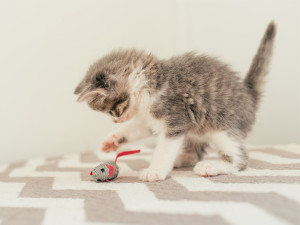5 Ways You’re Low-Key Ruining Your Cat’s Life
Just kidding, but you (or other pets) might be stressing them out more than necessary. Here’s how.

Share Article
Cats can be utterly confusing, but they are also just the best — especially that hairless one who kept hissing “Rachelll” in Friends. So, why do we stress out the ones we love? Turns out, lots of everyday activities in human life might be emotionally upsetting to our sometimes elusive, always entertaining little pals. If your cat is stressed, they’ll likely tell you that through excessive grooming, vocalizing, and changes in urination and eating habits. Sound familiar? Kinship spoke with Dr. Anna Delabar — co-founder of Pet Wellness Allianceopens in new tab, a nonprofit veterinary clinic offering wellness, sick, and behavior care in Columbia, Missouri — about what you might be doing to unknowingly stress out your feline.
Changing Your Routine
Like most animals (even humans — hello anxiety!), cats crave routine. Of course, that doesn’t mean you have to be perfect. By all means, sleep in on weekends! Just be as reliable as you can. “Remaining as consistent as you can will help your cat cope with changes and stressors,” Dr. Delabar says.
Moving Your Stuff
Speaking of stress factors, another one for your cat may be one of your favorite things: new furniture. Changing your cat’s environment, whether via moving or a DIY redesign, is a big source of stress. Try to make changes gradually, and make sure to always provide an enriching environment. According to Dr. Delabar, that can include toys, scratching surfaces, and food puzzles.
Loud Noises
Cats have ultra-strong hearing senses, with about three times the upper range of human hearing. This means when the garbage truck comes by, when the doorbell rings, or the neighbor’s dog barks incessantly, your cat definitely minds. But it also means high-pitched sounds, such as humming from lightbulbs and electronics, dimming switches, or the kettle heating up your nightly tea, could also be adding to your cat’s discomfort. Be sure to place your cat’s litter box and relaxing areas away from items that buzz or make noise.

Strong Scents
Those deliciously scented candles, essential oils, and scented body products can wreak havoc on your cat’s senses. Cats’ sense of smell is about 14 times stronger than humans’. This means when you lightly spritz your perfume on your way out the door, your cat probably feels like they’re stuck in the back seat of their great aunt’s car getting a hefty sniff of eau-de-toilette.
Many scents and smells associated with cleaning products can even be harmful to cats: ammonia, hydrogen peroxide, and other household cleaners are very irritating to cats’ eyes and skin. Essential oils can be accidentally absorbed or ingested, too, and exposing a cat to even the smallest amount of some oils can cause liver, respiratory, and even neurological problems.
Other Pets
Some cats are more social than others, and while they can form social groups as seen in cat colonies, they’re not “pack” animals in the way dogs are. Other animals in the home can contribute a variety of stressful factors to your cat’s environment. The sounds of barking, the smells of other dogs and cats, and the fast-paced play of dog housemates can leave your kitty feeling vulnerable.
But while they may operate very differently from our canine companions (their needs and communication styles are quite different), that stereotypical, un-trainable cat trope is mostly a myth. “Our culture often projects this image of an aloof cat who is independent or stubborn,” Dr. Delabar says. “But cats are complex creatures who are very intelligent and sensitive. They may be very different from dogs, but that does not mean they aren’t smart and can’t be trained.”
When you have a home with multiple pets, be sure to introduce them properly. This process may look different, depending on if you’re introducing a new dog, a new cat, or another animal to the household, but take it slow and try to follow the recommended steps for introducing new animals.
Keys to a Low-Stress Cat Household
No one can promise a completely stress-free environment all the time — especially in a world where new surprise episodes opens in new tab of The Last of Us could always pop up. But you can take steps to reduce the stress levels in your home. Stick to a routine as much as possible, avoid strong-smelling or chemical cleaners and bath products, try to keep loud noises to a minimum, and always introduce new family members at a pace your cat is comfortable with.
Most importantly? “Let your cat be a cat!” says Dr. Delabar, adding that providing the ideal enrichment allows your cat to “do their natural behaviors and meet very important emotional needs. Dr. Delabar also recommends picking up a copy of Decoding Your Catopens in new tab, written by board-certified veterinary behaviorists.

Mollie Jackman
Mollie Jackman is a writer, editor, and graduate of Lindenwood University’s MFA in writing. She’s also a pet parent to a goofy big-eared dog and two brown tabby cats, plus a rotating cast of foster animals. When she’s not reading, writing, or picking up strays, she can be found binge-watching arguably terrible reality TV shows and cooking competitions or rolling around the local skating rink in Columbia, Missouri.
Related articles
![A kitten laying on a persons lap with their paws in the air.]()
6 Things to Know Before Fostering a Cat
Ready to make a difference in a kitten’s life?
![cat coming out of litter box]()
What to Do When Your Cat Refuses to Be (Litter) Boxed In
An expert explains why kitties are so particular about where they pop a squat.
![A kitten playing with a mouse cat toy.]()
How to Keep Your Kitten From Making You the Toy at Playtime
Your cat deserves to play. You deserve to walk away unscathed.
![woman with dark hair lying in bed with striped cat, both asleep]()
Should I Let My Cat Sleep With Me? Things to Consider About Having Your Cat in Bed
Here are the pros and cons of having a feline sleeping buddy.
![A woman with curly black hair sitting in front of a dark purple and yellow backdrop while looking down affectionately at her two cats sitting on her lap]()
How to Build Your New Cat’s Trust in You
If your cat still approaches you with a figurative arched eyebrow of skepticism, try these tricks to put them at ease.
![An angry and hissing Siamese kitten standing on top of a laptop computer in the living room]()
You Don’t Have to Live Like This—You Can Get a Trainer For Your Cat
Tips to help you find a legit behaviorist (according to a veterinary behaviorist).









